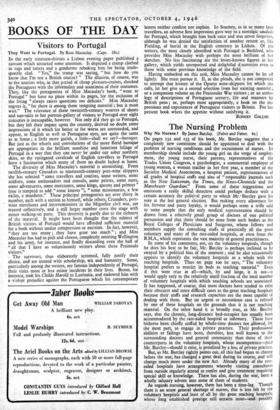BOOKS OF THE DAY
Visitors to Portugal
They Went to Portugal. By Rose Macaulay. (Cape. 18s.) IN the early nineteen-thirties a Lisbon evening paper published a cartoon which attracted some attention. It depicted a tramp clothed in rags and tatters and a gendarme rebuking him for being inade- quately clad. " Yes," the tramp was saying, " but how do you know that I'm not a British tourist? " The allusion, of course, was to the tourists who, in that period of cheap pleasure-cruises, shocked the Portuguese with the informality and scantiness of their costumes. They, like the protagonists of Miss Macaulay's book, " went to Portugal " but have no place within its pages, for the inclusion of the living " always raises questions too delicate." Miss Macaulay regrets it, " for there is among them tempting material ; but it must wait." The relevance of these twentieth-century wearers of shorts and sun-suits to her portrait-gallery of visitors to Portugal over eight centuries is inescapable, however. Not only dd they go to Portugal, but they left their impact upon the country, derived no doubt some impressions of it which for better or for worse are unrecorded, and appear, to English as well as Portuguese eyes, not quite the same as at home ; a little more garish, a little—shall we say?—baroque. But just as the whorls and convolutions of the more florid baroque are appropriate in the brilliant sunshine and luxuriant foliage of Portugal in a way that they can never be under our sober northern skies, so the variegated cavalcade of English travellers to Portugal have a fascination which many of them no doubt lacked at home.
The diversity of Miss Macaulay's material is astonishing. From twelfth-century Crusaders to nineteenth-century port-wine shippers she has selected " some travellers and ,tourists, some writers, some soldiers, some ambassadors and consuls, some priests, some nuns, some adventurers, some merchants, some kings, queens and princes " (one is tempted to add " some knaves "), " some missionaries, a few exiles, a murderer." These principal protagonists are over thirty in number, each with a section to himself, while others, Crusaders, port- wine merchants and interventionists in the Miguelite civil war, are treated collectively, and a still larger number cross the stage with minor walking-on parts. This diversity is partly due to the richness of the material. It might have been thought that the subject of British visitors of Portugal would have afforded sufficient material for a book without undue compression or excision. In fact, however, " they are too many ; they have gone too much " ; and Miss Macaulay has had to pick and choose, completely omitting Wellington and his army, for instance, and finally discarding even the half of " all that I have so voluminously written about these Peninsula visitors."
The survivors, thus elaborately screened, fully justify their choice, and are treated with scholarship, wit and humanity. Some, particularly among the writers, are famous independently of Portugal, their visits more or less minor incidents in their lives. Byron, for instance, took his Childe Harold to Lusitania, and endowed him with a violent prejudice against the Portuguese which his contemporary letters neither confirm nor explain. In Southey, as in so many later travellers, an adverse first impression gave way to a nostalgic saudade for Portugal, which brought him back once and was never forgotten, although he was denied the satisfaction of another return or, like Fielding, of burial in the English cemetery in Lisbon. Of the writers, the most closely identified with Portugal is Beckford, who provides Miss Macaulay with perhaps the most brilliant of her sketches. No less fascinating are the lesser-known figures in her gallery, which yields unexpected and delightful d.scoverjes even to those with some previous knowledge of the field.
. Having embarked on this task, Miss Macaulay cannot be let off lightly. She must pursue it. If, as she pleads, she is not competent to attempt that history of the Oporto wine-shippers for which she calls, let her give us a second selection from her existing material ; or a companion volume on the Peninsular War visitors ; or an antho- logy of descriptions of Portuguese scenery, life and manners by British pens ; or, perhaps most appropriately, a book on the im- pressions and experiences of Portuguese visitors to Britain. For her present book whets the appetite without satisfying it.
RODNEY GALLOP.






























 Previous page
Previous page